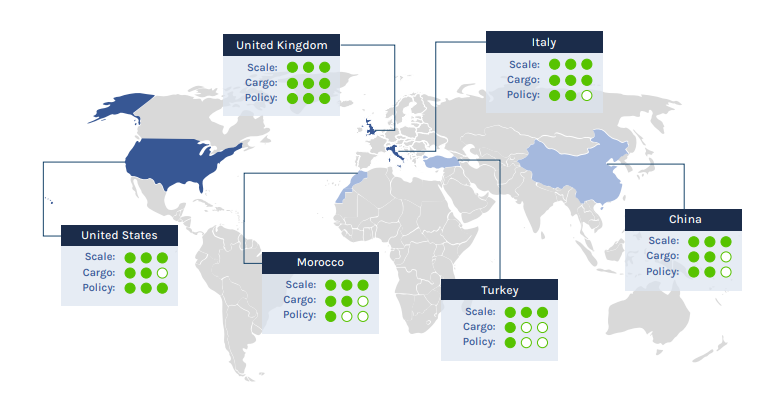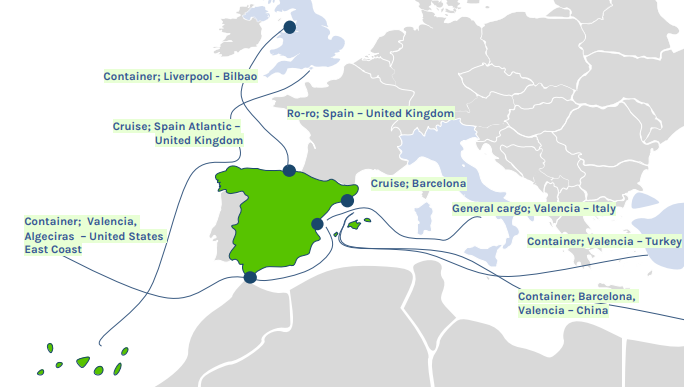The new study, Green shipping corridors in and out of Spain: Assessing route-based opportunities, by the Global Maritime Forum (GMF) aims to put Spain on the map of green shipping corridors by identifying international routes with high potential and facilitating stakeholder dialogue.
Overall, the study highlighted the eight most promising green corridor routes in and out of Spain. Based on the scale of trade, energy demand, dominant trade segments and policy environment, the analysis showed that the United Kingdom, Italy, and the United States are the most promising partner countries for Spain for the development of green corridors, followed by Turkey, Morocco, and China.

Findings indicate that there are various deep-sea opportunities in the container segment, such as container trade between China and the ports of Barcelona and Valencia and between US East Coast ports and Valencia and Algeciras.
The identification of these green routes offers opportunities to stimulate the growth of new value chains in Spain and the UK, including new zero-emission shipping technologies and services.
… said Francisco Álvarez, Public Policy Attaché at the British Embassy
Short sea opportunities within Europe were also identified, such as container traffic between the ports of Bilbao and Liverpool, container traffic between Valencia and Turkey and general cargo traffic between Valencia and Italy.
Finally, two promising cruise routes were also identified, Mediterranean cruise with Barcelona as home port and the Atlantic Spain-UK cruise route.

Several building blocks need to be in place to establish a green corridor, including a viable fuel pathway, customer demand for green shipping, enabling policy and regulation, and cross-value chain collaboration.
Key findings:
- High levels of interest and varying degrees of activity around zero-emission fuels among Spanish ports, as well as favourable conditions for potential bunkering of hydrogen-based zero-emission fuels.
- Potential demand for decarbonised freight and the presence of strong companies throughout the international shipping value chain further strengthen the case to advance green corridors in and out of Spain.
- Opportunities in the container, roll-on/roll-off, and cruise segments.
- Targeting routes with cargo owners within food and beverage, car manufacturing, and textile sectors is recommended due to large volumes, high-value trade, and balanced trade flows within these sectors.
- Spain has a robust regulatory framework in place that provides a good platform for policy action on zero-emission shipping fuels.
Provided stakeholders active on the routes are interested in pursuing the identified opportunities, a next step could be undertaking corridor-specific feasibility studies that place emphasis on the infrastructure, policy, and financial needs and conditions for securing local fuel supply from within Spain.
While working on this study, we encountered an impressive enthusiasm and deep understanding of the potential of green corridors across Spanish stakeholder groups.
… noted Jesse Fahnestock Project Director at the Global Maritime Forum.
Moving forward, relevant policymakers, such as the Spanish Ministry for the Ecological Transition and the Demographic Challenge, should be involved in the process of developing the corridors’ implementation plans, as national, bilateral, and regional policy measures will be key to the success of the corridors.
The decarbonisation of the routes such as the ones featured in the report will have a great impact due to the volume of freight and passengers they carry and the huge potential that exists in moving from road to sea.
… said Andima Ormaetxe, Director of Operations, Commerce and Logistics at the Port Authority of Bilbao
To remind, Spanish and Dutch ports have been signing deals for green corridors this month, including the ports of Algeciras and Rotterdam and Iberdrola, ACE Terminal and Hynetwork Services.






























































